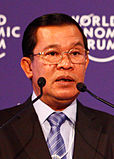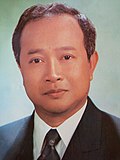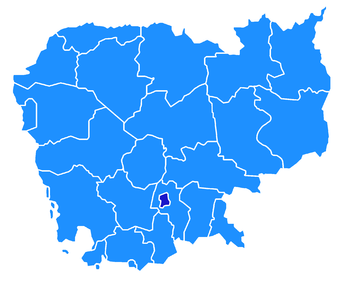Cambodian parliamentary election, 2003
|
|
|||||||||||||||||||||||||||||||||||||||||||||||||||||||||||||||||||||||
|
|||||||||||||||||||||||||||||||||||||||||||||||||||||||||||||||||||||||
|
|||||||||||||||||||||||||||||||||||||||||||||||||||||||||||||||||||||||
|
|
|||||||||||||||||||||||||||||||||||||||||||||||||||||||||||||||||||||||
|
|||||||||||||||||||||||||||||||||||||||||||||||||||||||||||||||||||||||
Hun Sen
CPP
Hun Sen
CPP
General elections were held in Cambodia on 27 July 2003 to elect members of the National Assembly. The election was won by the incumbent Prime Minister Hun Sen's Cambodian People's Party, who claimed a majority of 73 seats in the 123-seat parliament. However, due to the requirement for a two-thirds majority to elect a Prime Minister, a new government was not formed until July 2004 when a deal was reached with the Funcinpec party.
Cambodia became a democracy in the early 1990s with the first democratic election held in 1993. After both elections during the 1990s the Cambodian People's Party formed coalition governments with the royalist Funcinpec party. The last election in 1998 saw significant amounts of violence and intimidation of opposition supporters. It took place a year after Funcinpec had been violently ousted from the coalition government by the Cambodian People's Party. However following the election they once more formed a coalition with Hun Sen as Prime Minister and Funcinpec's leader Prince Norodom Ranarridh, the son of King Norodom Sihanouk, as his deputy.
...
Wikipedia




